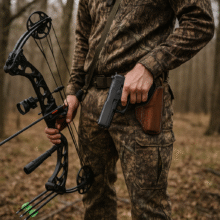Navigating the Waves: The Thrill of Sea Duck Hunting

Table of Contents
Introduction
Sea duck hunting is a challenging and exhilarating aspect of waterfowl hunting that takes adventurers into the vast, open waters where freshwater meets the sea. This unique type of hunting targets species such as eiders, scoters, and long-tailed ducks, known for their hardiness and distinctive behaviors. Unlike their freshwater counterparts, sea ducks inhabit coastal environments, requiring hunters to adapt to the unpredictable nature of marine elements. This guide explores the essentials of duck hunting, from understanding the quarry to mastering the techniques needed to thrive in this dynamic environment.
Understanding Sea Ducks
Species and Habitats
Sea ducks are distinguished by their preference for coastal waters. They are typically larger and more resilient to harsh weather conditions than other ducks. These birds often feed and live far from shore, requiring hunters to venture into open water.
Behavior and Patterns
These ducks have unique behaviors, including diving deep underwater for food, which can make them challenging to hunt. They’re also known for flying in fast, erratic patterns, requiring precise shooting skills.
Preparation and Gear
Boats and Equipment
A seaworthy boat is essential for sea duck hunting. Many hunters prefer layout boats for their low profile and stability in rough waters. Additionally, decoys specific to sea duck species, along with long lines and heavy anchors, are necessary to set a convincing spread in coastal currents.
Clothing and Safety Gear
Due to the cold, often unpredictable marine environment, wearing waterproof, insulated clothing and a personal flotation device (PFD) is crucial. Hunters should also equip themselves with navigation tools, communication devices, and safety equipment suited for marine use.
Hunting Strategies
Decoy Spreads
Setting up an effective decoy spread in coastal waters requires understanding the specific species’ behaviors and preferences. Sea ducks are attracted to large spreads, so utilizing a mix of species-specific decoys can increase visibility and effectiveness.
Shooting Techniques
The fast-flying nature of sea ducks demands quick reflexes and precise shooting. Practicing with moving targets can help hunters improve their accuracy and timing.
Ethics and Conservation
Hunting sea ducks comes with a responsibility to practice ethical hunting and contribute to conservation efforts. Hunters should adhere to local regulations, respect wildlife populations, and participate in habitat preservation initiatives.
Conclusion
Sea duck hunting offers a unique blend of adventure, challenge, and the opportunity to connect with the coastal wilderness. By understanding the habits of sea ducks, preparing adequately, and employing strategic hunting techniques, hunters can experience the thrill of navigating the waves in pursuit of these remarkable birds.
Frequently Asked Questions (FAQs)
1. What makes sea duck hunting different from other types of duck hunting?
Sea duck hunting involves open water environments, targeting specific sea-faring species, and often requires specialized equipment and boats.
2. Can you hunt sea ducks from shore?
While it’s possible in some locations, most sea duck hunting is done from boats due to the birds’ offshore habits.
3. What’s the best time of day for sea duck hunting?
Early morning or late afternoon are typically the best times, aligning with the ducks’ active feeding periods.
4. Do I need a special permit for sea duck hunting?
Regulations vary by location, but hunters usually need the appropriate waterfowl licenses and stamps, with some areas requiring additional permits.
5. How can I get started with sea duck hunting?
Begin by researching and understanding the species, gear up with the appropriate equipment, and consider hiring a guide or joining experienced hunters to learn the ropes.
It is not just a pursuit of game but a call to adventure, testing one’s skills against the backdrop of the majestic coastal environment. It’s an invitation to immerse oneself in the natural world, respecting and conserving the habitat that sustains these remarkable birds.
You can also visit : How to Hunt Duck







